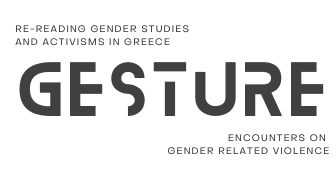Aims & Objectives
The research speaks to the noticeable escalation of gender-related violence in Greece, drawing attention to its many forms, be it against women, lgbt and queer subjectivities, racialised groups. At the same time, the research addresses the relationship between academic and grassroots gender discourses, practices, and identities at a time when both academic as well as activist voices have gained more visibility, confronting the power of mainstream, usually hostile, publics, but also each other.
In this sense, the double focus of the research, looking at the relationship between gender studies and gender activisms in Greece, through the lens of gender-related violence, speaks to two challenges or questions:
a) how does the institutionalization of gender studies impact the relationship with the movement and with struggles against gender violence, and, at the same time, how does the rise of the movement affect the hegemony of gender studies in defining and addressing gender-related violence?
b) how is gender-related violence represented, and what kinds of silences or erasures are at play, rendering certain kinds of violence less visible, legitimised, or normalised? In other words, GeStuRe is concerned with how institutional and grassroots gender-politics interact and impact understandings of and resistances to gender-related violence.
Research objectives
a)To research the relationship between the gender studies and gender activism in contemporary Greece, highlighting antitheses, contradictions and/or synergies between the two fields as far as the issue of gender violence is concerned.
b)To highlight different understandings and interventions concerning gender-related violence, especially those marginalized or erased by more legitimized/authoritative/validated positions in academic gender studies, gender activism, or civil society, to address the intersections between the social and the epistemic aspects of gender violence.
c)To understand the intersections between gender, sexuality, ethnicity, class, and violence, to raise awareness of the many different forms of gender-related violence.
Methodologically, the project develops a tripartite approach to the study of the transformations of gender studies and activisms in Greece. First, it aims to document and critically analyse the existing corpus of scholarship on gender-related violence through archival research. Second, it pursues a deconstructive re-reading and re-assembling of the archive, situating it in the context of the tensions as well as synergies between gender studies and activisms. Third, it investigates through qualitative empirical research how the relationship between gender studies and activisms impacts the understandings and struggles against gender-related violence today. Fieldwork involves biographical research with key feminist and queer activists and scholars, as well as qualitative interviews and focus groups with members of activist and civil society initiatives in two diverse locations, Athens, and Crete.
